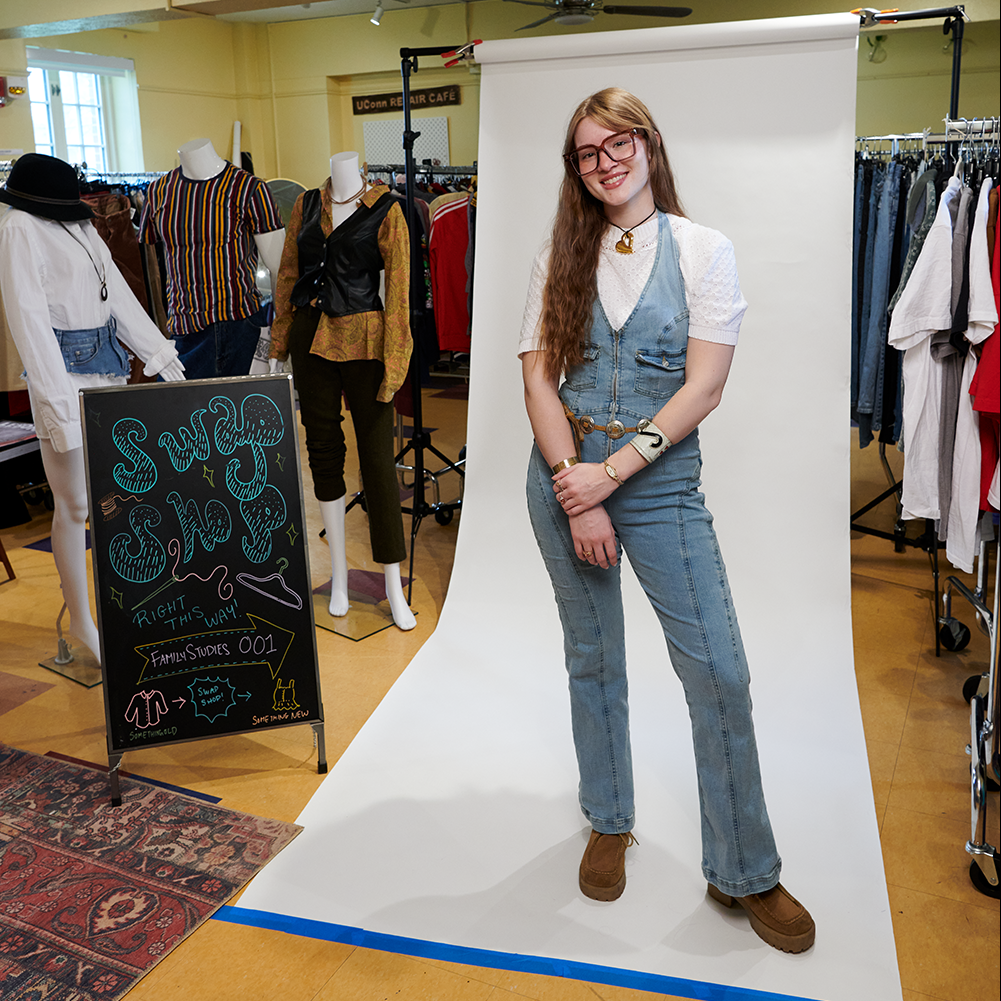Rage Against The Fashion Machine

Madeline Kizer models an Urban Outfitters jumpsuit from an overstock retailer, an upcycled license plate cuff, a $1 thrifted belt, Mudd shoes from eBay, and thrifted jewelry.
Madeline Kizer '24 (BUS) would like us all to take a moment to consider what is required to make a single cotton T-shirt: land, labor, pesticides, and other resources to grow and process the cotton; chemicals and dye to turn the fiber into fabric; labor and power to transform that fabric into a shirt — not to mention transportation through each step. Chances are that a consumer buys the tee for significantly less than the cost of the labor and resources used to produce it.
The current culture of disposable or fast fashion is harmful to the environment and to human rights, says Kizer. "If something is so cheap, that's how you know it's not sustainable."
Last fall Kizer, with Efua Koomson '22 (CLAS) and Lyla Andrick '24 (CAHNR), opened the UConn Swap Shop, where students can purchase clothing with credits earned from donations to promote sustainable shopping habits. "We want to raise awareness about sustainability and get people to talk about it," says Kizer.
At the campus Swap Shop, students also can have clothing altered, attend workshops on sewing and upcycling, hear talks about fast fashion, and shop for goods from student-run small businesses.
As a first-year student in UConn's F3 program for female entrepreneurs, Kizer, who grew up thrifting with her grandmother, created a thrifted clothing brand she called "kizerskollection." Through her research, she came across clothing swap events in the U.K. and decided to bring the concept to UConn.
"In the fall of 2021, I started hosting small events and pitching at various pitch competitions," says Kizer. "I realized that it would be beneficial for students to have a place where they can go and just recycle everything they have at school."
At first, Kizer's plan was met with some doubt, but she wasn't dissuaded. She applied for and received a UConn IDEA grant and then, with Koomson and Andrick, a grant from the UConn Office of Sustainability. After official approval from UConn President Radenka Maric, the three set up shop in a former café space in the Family Studies Building.
Compared to a cash business, the swap model "is almost more beneficial" to spurring a cultural shift, Kizer says, "because it encourages students to think about how much they're consuming and to look back in their closets for things they can donate to pursue this item that they think they're going to get more use out of."
Kizer hopes the Swap Shop — where students have donated gems such as never-worn Doc Martens and Ugg boots and "amazing vintage pieces" — will open people's eyes to what is possible. "Throughout all of the swaps I've held, I have really tried to glamorize thrifting so that it attracts more people and encourages those who wouldn't normally thrift to do so."
By Elaina Hancock
Photo by Peter Morenus

Leave a Reply